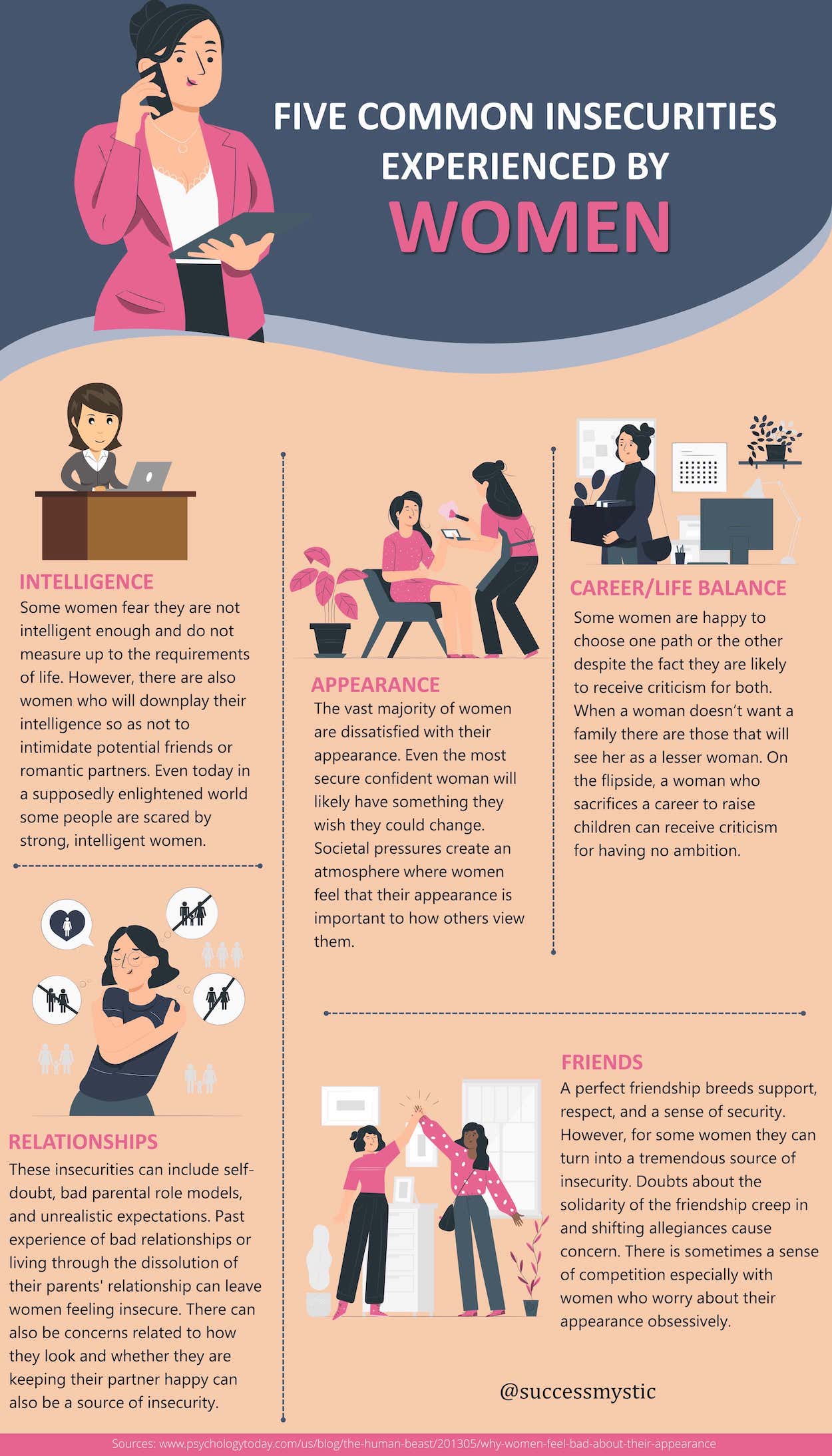Battling insecurities can feel never ending. Insecurity, or the feeling that you aren’t good enough for something or don’t measure up to a certain societal standard, can haunt you in many different areas of life.
Some folks experience multiple types of insecurities, but some common sources include insecurity in:
- Relationships
- Jobs or careers
- Basic needs
- Social interaction
- Body image or personal appearance
Feeling insecure in one or more of these areas isn’t uncommon. Everyone experiences insecurity in some way or another during life. It’s a typical experience to feel some self-doubt and experience an insecurity at some point; usually, these minor insecurities fade and pass with time.
However, some folks develop insecurities that do not pass. Instead, they can worsen and become incredibly difficult to manage. Without proper treatment, insecurity can cause a person to develop mental health issues (or make existing ones even worse).
30 Ways To Eliminate Insecurity
Fortunately, it is possible to eliminate insecurity from your life. It’s a process that requires a lot of time and practice to achieve, but with these 30 methods for eliminating insecurity, you can find some strategies to get yourself started.
1| Understand that nobody is 100% perfect–yourself included.
This is a tough but vital life lesson that is key in many issues, but particularly when you’re trying to overcome insecurities. It also takes a lot of repetition and practice to learn, but it is foundational for beginning to overcome an insecurity.
Insecurities are usually rooted in the idea that you aren’t good enough for something. You may think you’re not good enough for your partner, smart enough to do your job, attractive enough to dress a certain way–the insecurity possibilities are endless.
Allowing yourself to accept the fact that nobody is 100% perfect is a key step in eliminating any type of insecurity because it helps put your feelings into perspective. When you put pressure on yourself to meet a bunch of difficult standards or be perfect, you’re putting yourself in an impossible position! Nobody else around you can be perfect–this means you shouldn’t expect total perfection from yourself, either.
2| Talk to a trusted friend or family member.
When you feel insecurity getting a tight grip on your wellbeing, reach out to someone you trust. A good, honest conversation with them can also help you gain some perspective in your insecurities.
Choose a close friend or family member you can speak with freely for this conversation. Discussing insecurities can feel raw and exposing. Choose a person who will listen and provide gentle, honest feedback about your feelings. Often, hearing an outsider’s perspective of your feelings can help you understand why your insecurities are happening.
3| Make your needs a priority in life.
Taking time to care for yourself is helpful in eliminating insecurity. When your insecurities tell you that you aren’t good enough for something, combat those difficult feelings by giving yourself lots of care, affection, and positive attention!
Prioritize your needs. If you’re feeling sick, take the day off from work. If it’s time for your dental appointment, make sure you go. If you can’t accept a friend’s request for help, let them know your schedule won’t allow it. Your personal needs are important and deserve to be honored.
When you take time to address your personal needs and make them top priorities, you’re fighting against your insecurities directly. Taking time to care for yourself reinforces an important message to yourself: “I am important and worthy of care.”
4| Take time to reflect on the good things in life.
Insecurities usually dwell in a swamp of negative thoughts. If you find yourself trapped in this bog of negative self-talk and warped perspectives, make sure you take some time to reflect on the good things in your life.
It’s easy to lose sight of good, happy things in life when insecurities lead you to believe everything is going badly, but this is rarely ever the case. If you’re giving yourself a lot of time to dwell on negativity and insecurities, be fair and also allow time for reflecting on the good things, no matter how big or small they might be.
5| Practice trading negative self-talk for positive language.
Insecurities lead to a lot of negative self-talk. For example, someone struggling with insecurities may find themselves saying or thinking the following:
- I’ll never be as [smart, good, pretty, etc.] as they are.
- I shouldn’t even bother trying; I’ll just make everything worse.
- There is no way they’d want to talk to me.
- If I try to do that, I’ll look stupid in front of everyone.
- I am going to get myself fired if I keep making these dumb mistakes.
….and so on. Unfortunately, there are tons of ways an insecurity can make you speak negatively to or about yourself. Depending on your specific types of insecurities, you can probably think of some other, more specific ways you allow your insecurities to direct your thinking down a negative pathway.
Learning to trade negative self-talk for positive language is a key method for eliminating insecurities. This takes practice but is an effective method for changing the way you think about yourself and putting your insecurities into a different perspective.
For example, pretend one of your recurring negative self-talk phrases is “if I try that, I’ll look stupid in front of everyone.” This particular negative self-talk is stopping you from trying something new. Your insecurity wants you to believe that you’ll fail but try putting a positive spin on your perspective.
For example: Instead of saying “if I try that, I’ll look stupid in front of everyone,” try telling yourself something more positive, such as:
- I am a beginner, and beginners usually make mistakes. That’s normal.
- Everyone has to have a first time when they try something new.
- All these other people either haven’t tried this activity themselves or were also first timers at some point.
- If I try that and make a mistake, people probably won’t notice or remember it.
These positive phrases eliminate negativity and bring reality back into perspective. Take that, insecure negative self-talk!
6| Challenge yourself to really examine your emotions when you feel them.
Insecurities and emotions are directly tied together. When you’re feeling insecure, it’s often accompanied by waves of strong emotion. The next time you’re feeling insecure, try to determine the other emotions accompanying your insecure feelings.
For example, if you’re insecure about your bodily appearance, it may be triggered by jealous emotions. If your best friend has a socially accepted “perfect” thin body (and you don’t), you may experience those jealous feelings when you spend time with her.
Take a moment to sit with those emotions. Speak those thoughts and feelings out loud. For example, you can say “I’m feeling jealous because my body doesn’t look like hers” or “these feelings of jealousy are sparked by my desire to look that way.”
Often, identifying and labeling certain emotions makes them feel less complicated. When you’re able to address your emotions, you can begin accepting and tackling them more effectively. Learning how to address these emotions can also help eliminate the insecurities that usually accompany them.
7| Make time for activities that make you feel happy.
Spend time doing activities you enjoy to help eliminate insecurities. Often, insecurities make you feel like you aren’t skilled enough to do a job correctly, make friends with certain people, or perform a certain way.
Immersing yourself in an activity you genuinely enjoy is a great way to remind yourself of your personal strengths and values. While you may still experience insecurities in other areas of life, your personal time with a favorite activity or hobby is not only an instant mood booster, but it’s also a reminder that you have lots of other great strengths and talents elsewhere.
8| Challenge your difficult thoughts.
Insecurities brew a lot of difficult, demeaning, and even harmful thoughts. If you find yourself plagued with negative thoughts or voices that keep perpetuating your insecurities, try challenging those difficult thoughts.
You can challenge difficult thoughts by using your inner voice to question them. Instead of letting the difficult thoughts take over and be the loudest voice inside your mind, use another inner voice to question them. Over time, this makes that challenging, mean voice lose power over your feelings and mindset.
For example, pretend one of your difficult thoughts is related to social insecurities. You feel like you can’t make friends and assume that everyone won’t like you, so you don’t feel comfortable even trying to make any new friends at all.
Your difficult thought: “Those people won’t like me, so I won’t try talking to them.”
Your challenge to that difficult thought: “I have no way of assuming that those people won’t like me. I won’t know until I try to have a conversation with them!”
This approach speaks back to that negative voice directly. Unfortunately, negative thoughts and voices can be loud and powerful–with practice, you can use other inner voices to challenge those difficult thoughts with facts, bringing your insecurities back into reality.
9| Silence your inner judge for good with radical self-acceptance.
Everyone has an inner judge–this is another negative voice that reminds you of bad thoughts and other insecurities you may have. For example, if you have insecurities about your body image, your inner judge may tell you particularly cruel things about your body based on those insecurities, such as these examples:
- You look way too [thin, fat, ugly, etc.] to wear clothes like that.
- Everybody is judging you based on how you dressed today.
- Nobody is going to love you because you look the way you do.
- You should feel embarrassed about going out looking this way.
- You’ll never look stylish enough to fit in with those people.
Your inner judge can pass on its unwelcome and unwanted judgements about many aspects of your life. No matter how frequent and annoying your inner judge’s voice is, you can learn to silence it.
One surefire way to silence your inner judge is to practice radical self-acceptance. This process takes practice and lots of trial and error. If your inner judge’s voice has been around for a long time, it can take extra time to learn how to silence it for good.
To practice radical self-acceptance, you’re going to learn how to make peace with aspects of yourself that you can change and can’t change. For example, if you’re a naturally short person, and your shortness is an insecurity of yours, there isn’t much you can do to change your height. You can begin accepting this insecurity by saying: “Yes, I’m short. So what? Being short doesn’t mean I can’t be loved or don’t deserve to be treated well.”
That is a radical thought to challenge a harsh inner judge! By repeating reminders like these to yourself when you feel your inner judge barging in, you’ll begin to challenge those assertions more frequently. Eventually, you won’t be able to notice your inner judge much at all….you’ll be too busy immersing yourself in accepting, positive talk.
10| Embrace your awkward moments and slip-ups.
This is an extension of the fact that nobody is ever going to be 100% perfect. Every single person, no matter how polished and perfect they appear, makes mistakes!
When you catch yourself making a mistake or experiencing an awkward moment, learn to embrace them rather than allowing your insecurities to use them as fuel to make you feel bad about yourself.
Any time you make a mistake, use it as an opportunity to learn. The next time you make a mistake, remind yourself that mistakes happen. Take note of what you could have done to avoid the mistake and use that knowledge to make your next experience better. Mistakes and awkward moments are facts of life–how you choose to handle them can make your life easier and eliminate insecurity.
11| Keep a running list of good things as they happen in the moment, whether they’re big or small.
Keep a small notebook in your bag or pocket. When something nice happens to you, jot it down. It doesn’t necessarily have to be anything major, like landing a big promotion, getting married, or winning the lottery–a great way to eliminate insecurity is to remind yourself that lots of small, good things happen, and those small things add up to mean a lot.
Whether you experience a big or small “good thing” in life, make note of it in your notebook. When you’re feeling doubtful about your abilities or insecure about something, revisit your list to reflect on some good things. This small reminder can help squash feelings of insecurity before they have time to turn into a full-blown negative spiral.
12| Try voice therapy to eliminate insecure thoughts.
Voice therapy is a cognitive strategy for overcoming insecurities. To participate in voice therapy, there are three main steps:
- Vocalize or jot down any negative, critical, or harsh thoughts you have about yourself in the second person. For example, instead of saying “I’m an idiot,” you would write down “you’re an idiot.” This exercise helps separate those critical voices from yourself. By using “you and you’re” instead of “I,” you’re recognizing that those mean voices are coming from elsewhere–perhaps from the past or a cruel voice that isn’t helping you.
- Examine your negative thoughts and see if they conjure images from the past. Often, insecurities and negative thoughts are developed from past trauma or other bad experiences. Did you have a relative who made you feel insecure about your body? Were you recently fired from your job? Any number of traumatic experiences can be linked to the formation of an insecurity.
- Respond back to your inner voices using the first person. This helps differentiate between your true self and your insecure, warped-perception self. For example, when you say, “you’re an idiot,” you can respond by saying “no, I’m not–I’m not an idiot at all.” This method allows you to respond back to those negative, insecure voices as your true self.
13| Develop a mantra to help bring you back to reality if your thoughts begin to spiral negatively.
Mantras, known as single grounding words or phrases, can help you return to reality in the midst of a negative spiral. If you’re obsessing over an insecurity, a mantra can be a great tool to help you push past the insecurity.
For example, the next time you find yourself upset over an insecurity or spiraling into negative thinking, use one of the following mantras by repeating it to lift you out of the spiral and back into reality:
- My insecurity is an irrational fear.
- I know that isn’t true. My insecurity is playing tricks on me.
- My inner judge is being cruel.
- I know my insecurity isn’t true.
- I am stronger than my insecurities.
You can use one of these mantras or create your own based on your personal needs.
14| Give yourself permission to forgive and let go of the past.
Holding on to your old grudges and bad memories is great fuel for insecurities. When you keep reminding yourself of unfortunate events or failures from long ago, those distant memories can make a profound impact on your current life.
While this certainly takes time and practice, try giving yourself permission to let go of the past. Forgive others (and yourself, too) for things they’ve done to hurt you or cause your insecurities to grow over time. Often, when you reach a point where you feel like you can let go of this past negativity, your insecurities will begin to disappear.
15| Loosen yourself from the grip of comparison.
Comparison is the thief of joy. Whenever you spend time comparing yourself to others, it not only fuels insecurities, but also makes you forget all the ways you’re wonderfully unique.
It’s tough to see someone else living the life you want–whether they’re prettier, richer, thinner, happier, or whatever else you wish you were, it’s important to remember that you’re only seeing the surface of their life. While you wish you were more like them, that person likely has insecurities of their own, too!
Instead, focus on the aspects of yourself that you truly enjoy and make you feel unique. By focusing your energies on your own goodness, you’re creating an outlet for positivity rather than insecurity.
16| Practice more “yes, but” thinking.
The power of “yes, but” thinking is a simple yet effective way to derail your insecure thinking in its tracks.
During an insecure moment, allow yourself to add a “yes, but” statement at the end of your thought. This practice allows you to complete the thought and then rationalize it with a true statement that brings your situation into context. Since insecurity can cause you to have a warped perception of reality, this simple practice can bring you back into reality with the facts of a situation.
For example, an insecure thought you experience might be “I feel like all my friends hate me.” The next time you think this insecure thought, add a “yes, but” statement to the end of it, like so:
“I feel like all my friends hate me….”
- “But I know that’s not true because they support me when I’m struggling.”
- “But we’ve had lots of good times together.”
- “But we made plans to do an activity together next week.”
- “But they regularly tell me that they like hanging out with me.”
The “yes, but” model allows you to add a rebuttal to your warped insecure thoughts. By contradicting them with a fact based in reality, it helps you understand that your insecure thoughts are just reflections of incorrect perception, helping you eliminate your insecurities.
17| Step away from perfectionism.
We already know everyone makes mistakes. With this fact in mind, allow yourself to let go of perfectionism.
Everyone has an area or two in life where they maintain strict, often impossible standards for themselves. If these standards drive you to insecure feelings, it’s important to let go of perfectionism.
Just as everyone makes mistakes, everyone is also imperfect. Even the most polished people can’t attain absolute perfection–yourself included! If your high standards are fueling your insecure feelings, give yourself permission to step away from perfectionism.
18| Develop a growth mindset.
A growth mindset means you’re always looking for ways to move forward, learn, and develop. Whether you’re succeeding or making mistakes, if you have a growth mindset, you believe you can leave every situation with useful knowledge you can use to become a better person.
By approaching life with the idea of moving forward, learning, and developing, you’ll notice insecurities fading. When you’re focused on growing–even if it’s in small, baby steps–you won’t have time to focus on insecure thoughts. Instead, you’ll be focused on what you can do differently and how you can continue improving.
19| Remind yourself that you deserve good things to happen, and that often involves taking some risks.
Good things come to those who chase after them. This can be very scary–often, to go after a new opportunity involves some risk-taking. Insecurity may tell you that you aren’t good enough or brave enough to take risks, but this isn’t true.
Constantly remind yourself that you deserve good things to happen in your life. Those good things often involve some risk taking. Give yourself permission to chase after those opportunities. In some instances, you will succeed; in others, you’ll fail.
Regardless, if you never tried at all, you’ll stay the same. By going after good opportunities, you’re eliminating insecurities by focusing on positivity instead.
20| Take on the role of being your own best friend.
There’s nothing like having a best friend. Your best friend should be someone who loves and supports you no matter what, through thick and thin. Even if you already have best friends, consider putting yourself into the “best friend” role.
Yes, you can be your own best friend! The relationship you have with yourself is the closest and most valuable one you’ll ever have in life. Treat yourself the way you would a best friend–use supportive language, maintain positivity, and be kind. When you treat yourself this way, you begin to eliminate insecurities.
21| Let go of people who aren’t supporting your wellbeing.
Everyone’s had the experience of a toxic friend or family member. These folks disguise themselves as your supporters, but in reality, they’re actually harmful for your well-being. Toxic people often fuel your insecurities rather than quell them.
While it’s a tough conversation to have, allow yourself to disconnect from people who aren’t treating you the way you deserve. If someone you consider a friend or part of your family is doing or saying something that makes you feel insecure, let them go. Initially, it may be painful and difficult, but over time, you’ll notice your insecurities disappearing without these toxic folks there to fuel them.
22| Give yourself permission to brag about yourself when you do something well.
Don’t be afraid to brag about yourself when you make an accomplishment! When you spend time celebrating yourself and taking credit for the things you’re doing well, you’re boosting your confidence and eliminating insecurities.
Did you develop a great new system to make something easier at work? Did you finally train your dog to do tricks? Are you great at meal prepping? Can you run an eight minute mile? Whatever it is that you’re doing well, brag about it–even if it’s just to yourself!
23| Seek personal feedback from a trusted source.
When you’re feeling insecure about something, consider asking a trusted source for some feedback about how to improve or change your situation. While you can speak to a friend or loved one about this, consider asking someone in a more professional setting–such as your boss if you’re insecure about a work issue, for example.
Sometimes, friends and loved ones tell us exactly what they believe we want to hear rather than what we need to hear. While their kind and encouraging words are wonderful, they don’t always help you move past an insecurity. In some situations, addressing the insecurity head-on with some feedback about ways you can honestly improve is the best tactic.
24| Don’t give yourself a ton of time to dwell on a mistake or failure.
When a mistake happens, resist the urge to dwell on it for hours (or days….or weeks….) afterward. It’s easy to let your emotions and insecurities about the mistake weigh you down, but it’s essential to keep moving forward. The longer you spend overthinking about a mistake or failure, the harder it will be to overcome the insecurities surrounding the mistake and move past it.
Rather than giving yourself permission to spend way too much mental energy on obsessing over a mistake, acknowledge it and then make a plan to move forward. This is another good opportunity to try more “yes, but” thinking.
For example: “Yes, I made a mistake at work, but now I know how to avoid that mistake tomorrow.”
This type of thinking acknowledges the mistake and gives you space to move forward positively rather than dwell on the negatives.
25| Spend a little time at the end of each day reflecting.
When life feels like a rat race, you may forget to take time and reflect on each day’s events. This contemplative time at the end of each day is an essential way to analyze the day’s events.
By purposefully reflecting on the day’s events, whether it’s through meditation, journaling, or talking about it with a friend, you’re able to slow down enough for a moment to consider all that happened to you. Reflect on the good, learn from the bad, and determine places where you need improvements to eliminate further insecurities.
26| Prepare yourself in advance if you know you might be in a situation that brings out your insecurities.
If you’ve ever heard the popular phrase “fake it ‘til you make it,” you can put that saying into action to fight your insecurities. If you know you’re going to be in a situation that will potentially trigger your insecurities, you can prepare yourself in advance to handle the situation with ease.
While you may feel insecure in the moment, by “faking it” through the situation, you can support yourself through moments of discomfort, fear, or self-doubt. In the end, you’ll survive the situation that triggers your insecurities and finish the ordeal a little bit stronger.
For example, pretend you feel insecure about wearing a swimsuit in front of others. Your sister is throwing a huge pool party. You know you must go to the party–all your friends will be there, and your sister is counting on your help to make the party successful. Even though you feel major insecurity about your body image, you know you’ll need to rock the swimsuit to participate in the party.
Prior to the date of the party, you can begin to strategize how you’ll handle your body insecurities during the party.
A few strategies might include:
- Shopping around for a new swimsuit you genuinely enjoy and feel great wearing
- Practice telling some funny stories to share with friends at the party
- Plan to make some of your signature snacks to bring along and share (you know this is an area where you shine–show off those cooking skills for a confidence boost!)
These strategies help you prepare to face your insecurity with some extra self-confidence. When the party rolls around, you’ll have a better time and be able to be there fully to support your sister.
27| Be an observer of others and take note of what you see.
We already know that nobody is perfect. If you take time to really observe other people, you’ll begin to see those imperfections for yourself. Taking note of these imperfections is a great reminder that everyone slips and makes mistakes from time to time.
When you’re hyper focused on your own worries or insecurities, you miss seeing the same types of mistakes others also make. For example, at your next work meeting, sit back and watch your coworkers’ actions and mannerisms. While you’ve been busy worrying about whether or not you’ll sound smart enough during your presentation, you’ve likely missed your coworkers making errors of their own, such as telling an inappropriate joke, spilling their coffee, or forgetting an important statistic in a report.
It’s easy to isolate yourself because of your personal insecurities, but when you realize everyone else is also making mistakes, it’s easier to begin eliminating your own insecurity and fear.
28| Change up the categories in which you place the most value.
Folks with insecurities often put high priority in areas that don’t need to be high priority. For example, think back to the swimsuit example from #27. If you’re so worried about your body image, you place a lot of priority on your appearance. In this situation, your priorities should be on helping your sister and having a good time at the pool party.
Insecurities can cause you to place a lot of importance in areas of life that don’t require it. Instead of focusing on the more important parts of life, you let your insecurities pull you away from having good times, good relationships, and good experiences.
Examine your life’s categories–are you placing too much emphasis on areas that don’t bring happiness or value to your life? If so, begin rearranging your priorities in a way that can help you eliminate insecurity.
29| Identify any connections between your insecurities and past events that may have fueled them.
If the idea of practicing voice therapy sounds a little intimidating, simply the process by drawing some basic connections between your insecurities and what may have ignited them. Usually, insecurities are sparked by past trauma and negative experiences.
For example, pretend you feel insecure about your personal safety. You know this insecurity isn’t a legitimate fear–you live a comfortable life in a safe neighborhood with friends nearby, so you don’t have a pressing reason to be scared for your safety. On a piece of paper, jot down any previous memories you have about being scared for your personal safety.
Through this form of reflection and journaling, you may realize that your insecurity of fearing for your personal safety stems from long-ago events that left you with foundational memories of being scared for your safety. For example, a scary brush with a stranger during your childhood or a traumatic event at school could have made you fear for your safety so badly that it left a deep impression on you, causing the insecurity to form.
Identifying and exploring these connections is a big step toward eliminating the insecurity. When you understand the root causes of an insecurity, you can begin to heal from it.
30| Find a mental health professional for more guidance.
If your insecurities begin to feel like too much to handle on your own, don’t hesitate to seek a professional for guidance. A good therapist or counselor can help you really unpack your insecurities, understand them better, and work toward eliminating them for good.
While it’s great to work on eliminating insecurities through your own practice, there is never any shame in working with a professional. A therapist or counselor can identify strategies that will work best for your needs, helping you find relief from insecurity quickly in a safe space.
Infographics: 5 Common Insecurities Experienced By Men and Women









